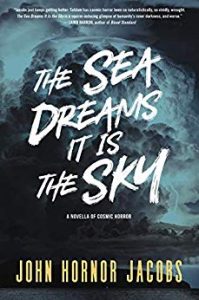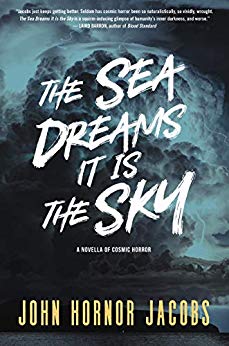John Langan Reviews The Sea Dreams It Is the Sky by John Hornor Jacobs
 The Sea Dreams It Is the Sky, John Hornor Jacobs (Harper Voyager $3.99 127pp, eb) October 2018.
The Sea Dreams It Is the Sky, John Hornor Jacobs (Harper Voyager $3.99 127pp, eb) October 2018.
John Hornor Jacobs’s The Sea Dreams It Is the Sky is an excellently written, Lovecraft-inflected novella concerned with the history of an invented South American nation and the life of its most famous poet. It begins in Malaga, Spain, in 1987, with Isabel, the first-person narrator, noticing an older man wearing an eye patch who is seated at one of the tables at the cafe to which she retires after teaching. The locals have nicknamed him “The Eye.” After a few weeks, the man finally introduces himself, asking Isabel where in Magera she is from. The two of them have recognized each other as refugees from the country (whose approximate location stretches across northern Argentina and Chile), whose government was taken over by a fascist regime some years before. The Eye invites her to accompany to him to the movies and she accepts, only to find that the films he prefers are gaudy melodramas produced in Mexico, movies about luchadors and monsters, during which the man laughs at all the wrong places. Nonetheless, she continues to go to the movies with him, and a kind of friendship develops. Only after that relationship has developed does Isabel learn the Eye’s identity. He is Rafael Avendaño, a Mageran poet she calls the most infamous in South America, thought murdered when the fascists seized power in Magera. In temperament, Avendaño was a kind of mix of Charles Bukowski and Norman Mailer, a hard-drinking womanizer, a controversialist who delighted in offending large swaths of his reading public. Had Isabel encountered him at this stage of his life, their friendship likely would have withered on the vine; but whatever trauma cost him his eye has gentled him. He is done with poetry, he tells Isabel: his experiences in Magera killed the part of him that created it. He follows the revelation of his identity with a request that Isabel watch his apartment because he is leaving Spain, returning to Magera. It’s a potentially suicidal decision, one from which Isabel tries to dissuade him, but Avendaño is insistent. In the end, she agrees to apartment sit for him, and he departs for his homeland.
While she is enjoying the poet’s larger accommodations, Isabel discovers an unpublished manuscript, Below, Between, Beneath, Beyond. It appears to be a memoir of the time leading up to and immediately after the fascist takeover. The narrative starts with him living with his current paramour at the seaside house to which he has retreated to work on what is to be a grand novel. While he is there, he comes into possession of a small library belonging to a professor who has been something of a mentor to him. Among the professor’s books is a generous selection of pornographic photographs, concealed amongst which are about 20 pictures of pages from an old manuscript composed in Latin and Greek. Avendaño’s old mentor had made tentative efforts to translate a few of the pages; drawn by the challenge the text presents, he puts aside and eventually abandons his novel in favor of rendering into Spanish the text of Opusculus Noctis, which he translates as A Little Night Work. He becomes obsessed with his task, causing his lover briefly to abandon him. After her departure, he abandons himself to what has become an effort not merely to translate the text, but to improve it, to write it in a Spanish of his particular style. Before long, his lover returns, and soon thereafter, the soldiers arrive.
The novella now returns to the present, to find Isabel growing increasingly concerned about Avendaño’s fate. She locates the original photos he was working from, and picks up his work; albeit, focusing more on accurate translation than rhetorical flourishes. The substance of the text first Avendaño and then Isabel labors over will be familiar to anyone acquainted with horror fiction of the Lovecraftian and even M. R. Jamesian traditions. A compendium of mysterious and sinister images and words, it’s both a register of occult knowledge and practice and a kind of embodiment of those same elements, so that to read it (let alone, to wrestle with its language in the effort to convey its meaning) is itself sorcerous practice. Nor does such activity go unnoticed by the various powers it is meant to address. It’s one of Jacobs’s singular accomplishments to take what is at this point a familiar trope and invest it with fresh unease and tension. This is due to the juxtaposition of A Little Night Work and the national calamity that has befallen Magera, a disaster that has continued to unfold throughout the fascists’ rule, and to which Avendaño has returned. The disorder of the text, with its references to primal powers, to sacred violence, to blood and pain, is a hyper-realization of the same impulses that animate fascism. It’s not that the manuscript’s subject is a symbol for political tyranny, or that the government of Magera is a symbol for the powers the manuscript treats; rather, the two exist in dialogue with one another.
Eventually, Isabel decides to return to Magera, herself, in pursuit of Avendaño, to whom, it’s ever more clear, something terrible has happened. Jacobs provides a hint of the poet’s fate when Isabel reads the remainder of his memoir, which treats his experiences following the fascist takeover. After undergoing sustained torture at the hands of the new regime’s thugs, Avendaño is approached by a well-dressed man he takes to be an American. This man, Wilson Cleave, offers him a chance to escape what appears to be his likely death; all he has to do is continue his translation. In the course of their ongoing interactions, Cleave reveals himself to be an emissary of something much stranger and more frightening than Avendaño had expected. He also discloses that, during the fugue states into which the poet enters while engaged with A Little Night Work, Avendaño has committed his own personal atrocity, one he cannot remember. To resist and escape Cleave, Avendaño goes to extreme lengths; though afterward, the possibility that Cleave might be telling the truth shatters him and seems to be what hurts him out of poetry. Years later, Avendaño’s continuing doubt over Cleave’s information will be his primary motivation for returning home.
What Isabel finds when she crosses into the place from which she has been an exile brings together Avendaño’s narrative and hers, the two of them converging on a bleak ocean shore where great evil is carried out in the most banal fashion. Ending stories of cosmic horror effectively is perhaps the most difficult part of writing them. So much has been hinted at in the early pages of the story, it’s a challenge to arrive at a climax that doesn’t squander those hints by either diluting or overinflating them. Jacobs walks this narrative tightrope with grace and bravura, bringing his novella to a crescendo that is at once shocking and resonant. A story of transformations and translations, of the wounds history inflicts upon the self, of the scars we embrace to save ourselves, The Sea Dreams It Is the Sky is moving and memorable, one of the novellas of the year.
John Langan is the author of two novels, The Fisherman (2016) and House of Windows (Night Shade 2009), and two collections of stories, The Wide Carnivorous Sky and Other Monstrous Geographies (2013) and Mr. Gaunt and Other Uneasy Encounters (2008). With Paul Tremblay, he co-edited Creatures: Thirty Years of Monsters (2011). One of the founders of the Shirley Jackson Awards, he served as a juror for its first three years. He lives in New York’s Mid-Hudson Valley with his wife and younger son.
This review and more like it in the January 2019 issue of Locus.
 While you are here, please take a moment to support Locus with a one-time or recurring donation. We rely on reader donations to keep the magazine and site going, and would like to keep the site paywall free, but WE NEED YOUR FINANCIAL SUPPORT to continue quality coverage of the science fiction and fantasy field.
While you are here, please take a moment to support Locus with a one-time or recurring donation. We rely on reader donations to keep the magazine and site going, and would like to keep the site paywall free, but WE NEED YOUR FINANCIAL SUPPORT to continue quality coverage of the science fiction and fantasy field.






